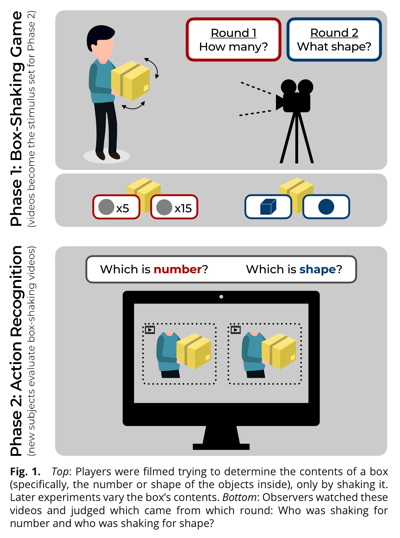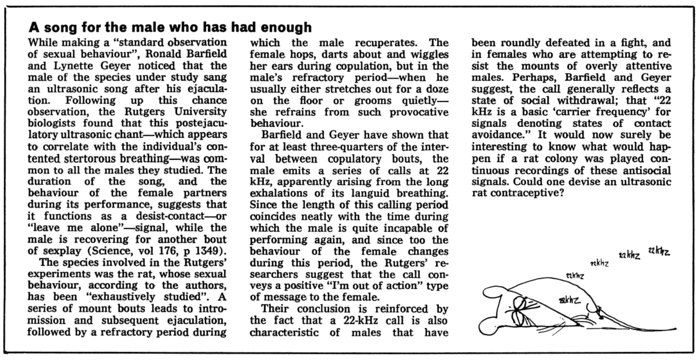Science
By 2531 everyone in Japan will be named Sato
Japanese demographics professor Hiroshi Yoshida has warned that by 2531 everyone in Japan will have the last name 'Sato'.Why? Because a) Sato is the most common last name in Japan, and b) Japanese law requires that married couples use the same last name. Because Japanese women almost always take their husband's name, this means that the surname 'Sato' is slowly crowding out all other names.
From the Guardian:
The Think Name Project is promoting Professor Yoshida's research as a way to gain support for ending Japan's law requiring couples to have the same surname.
More info: spoon-tamago.com/

Posted By: Alex - Thu Apr 04, 2024 -
Comments (3)
Category: Odd Names, Predictions, Science, Asia
Beatniks Under the Microscope


Posted By: Paul - Wed Mar 27, 2024 -
Comments (0)
Category: Science, Bohemians, Beatniks, Hippies and Slackers, 1950s
Are we swallowing other universes?
An unusual cosmological hypothesis was recently published in the Journal of Cosmology and Astroparticle Physics. At least, it's an idea I haven't heard before.It suggests that our universe has been swallowing "baby universes," and that this eating habit is the cause of the observed accelerating rate of expansion of our universe.

The article, authored by researchers from the Niels Bohr Institute and the Tokyo Institute of Technology, quickly veers off into mathematics that's incomprehensible to me. But I can extract a few interesting ideas. For instance, what if the initial "Big Bang" of our universe was caused by us (when we were still a baby universe) being swallowed by a larger universe?
And what would happen if, now that we're an adult universe, we collided with another adult universe? The researchers don't answer this question, but I'm guessing the outcome wouldn't be good.
More info: "Is the present acceleration of the Universe caused by merging with other universes?"
Posted By: Alex - Wed Mar 06, 2024 -
Comments (3)
Category: Science, Spaceflight, Astronautics, and Astronomy, Weird Theory
Fatigue Vaccine
I wonder what was this "vaccine against fatigue" that scientists in the 1920s thought they had discovered. Methamphetamine perhaps? I know that the Nazis thought it was an anti-fatigue wonder drug.More info: Robert Armstrong-Jones (wikipedia)

Nottingham Evening Post - Nov 29, 1923

Daily Mirror - Nov 30, 1923

Shreveport Times - Nov 30, 1923
Posted By: Alex - Tue Feb 20, 2024 -
Comments (1)
Category: Science, Sleep and Dreams, 1920s
As Above
Very trippy. How much of the six minutes can you stand, without chemical assistance?
Posted By: Paul - Mon Feb 12, 2024 -
Comments (4)
Category: Science, Video, Abstract, Non-figurative, Non-representational
The science of shaking Christmas presents
Researchers at the University of Michigan have been studying people shaking boxes in order to shed light on "epistemic action understanding." Or rather, "Can one person tell, just by observing another person’s movements, what they are trying to learn?"In other words, as you watch someone shake a box, can you figure out what information they're trying to gather about the contents of the box (i.e. the shape or quantity of things in it)?
More info: "Seeing and understanding epistemic actions"

Posted By: Alex - Sat Dec 30, 2023 -
Comments (0)
Category: Science, Experiments, Psychology, Christmas
Twin Telepathy
1965: Two eye doctors published an article in the journal Science detailing what appeared to be a form of telepathy found in two sets of twins. The brainwaves of the twins seemed to be linked. When the brainwaves of one changed (by having him close his eyes), the brainwaves of the other twin would change also, even though the two were in separate rooms.The doctors examined 16 sets of twins, but only found the linked brainwave phenomenon in two of them. Why these two? The doctors speculated that they were "serene" whereas the other twins demonstrated "impatient anxiety and apprehension about the testing procedure."
It's surprising the doctors got their article published in Science, since that journal doesn't usually consider anything that smacks too much of parapsychology.
You can find a copy of their Science article ("Extrasensory Electroencephalographic Induction between Identical Twins") here.
More info about twin telepathy at Psi Encyclopedia.

Los Angeles Times - Dec 22, 1965

Science - Oct 15, 1965
Posted By: Alex - Sun Nov 12, 2023 -
Comments (5)
Category: Paranormal, Science, Psychology, Twins, Lookalikes & Doppelgangers, 1960s
Female mate avoidance behaviors in the European common frog
We posted recently about "misdirected amplexus," which is the phenomenon of male frogs attempting to mate with inappropriate objects (different species, fish, inanimate objects, etc.).Turns out that the weird frog sex behaviors don't end there. Male frogs, in their excitement, will occasionally form "mating balls" — "several male frogs cling to a single female – often killing her in the process."
Some German researchers have now found that female frogs, in turn, have developed defense strategies to protect themselves from over-excited males. They rotate to try to escape the male's grasp; they emit "release calls"; and if those strategies fail to work, they play dead:
More info: "Drop dead! Female mate avoidance in an explosively breeding frog" – technologynetworks.com
(Thanks to Gerald Sacks)
Posted By: Alex - Fri Oct 13, 2023 -
Comments (4)
Category: Animals, Nature, Science, Sex
Ultrasonic Postejaculatory Song of the Male Rat
We posted recently about some odd sexual behavior demonstrated by frogs (their frequent attempts to mate with inappropriate objects). Male rats also display an odd behavior. When they need to rest from mating, they sing an ultrasonic "leave me alone" song.More info: PubMed

Posted By: Alex - Sat Oct 07, 2023 -
Comments (0)
Category: Animals, Nature, Science, Sex
The Chimpomat
In one of our recent posts, there was a reference to the Chimpomat, a token-operated vending machine for chimpanzees created at the Yerkes Laboratories in the 1930s. Here's more info about it.
"Subject Kambi is shown about to drop a token into the slot of the chimpomat to 'purchase' food."
Info from The Ape People (1971) by Geoffrey H. Bourne:
By the process of lengthening the time between which they could earn the reward and when they could actually receive it by using the Chimpomat (by making the Chimpomat available only certain times of the day), the animals could be trained to collect plastic disks, in other words, to work for money. They would store up this money until the time came for them to spend it. Eventually they were trained to earn the money one day and spend it in the Chimpomat the following day.
On these occasions the animals used to walk around clutching their earnings to their breasts, sleeping on them at night so they would not be stolen, and getting very hysterical if any other animal came near their earnings or tried to take any of them away—a very human side of their actuvity and the dawn of ownership of private property and capitalism, a thought that has intriguing implications.
Posted By: Alex - Mon Oct 02, 2023 -
Comments (1)
Category: Animals, Science, 1930s

| Who We Are |
|---|
| Alex Boese Alex is the creator and curator of the Museum of Hoaxes. He's also the author of various weird, non-fiction, science-themed books such as Elephants on Acid and Psychedelic Apes. Paul Di Filippo Paul has been paid to put weird ideas into fictional form for over thirty years, in his career as a noted science fiction writer. He has recently begun blogging on many curious topics with three fellow writers at The Inferior 4+1. Contact Us |




